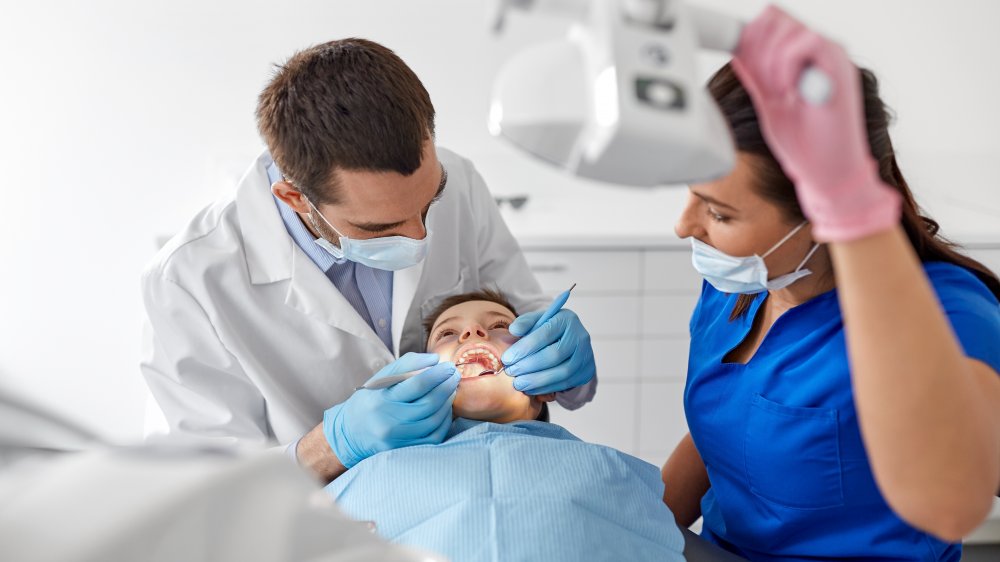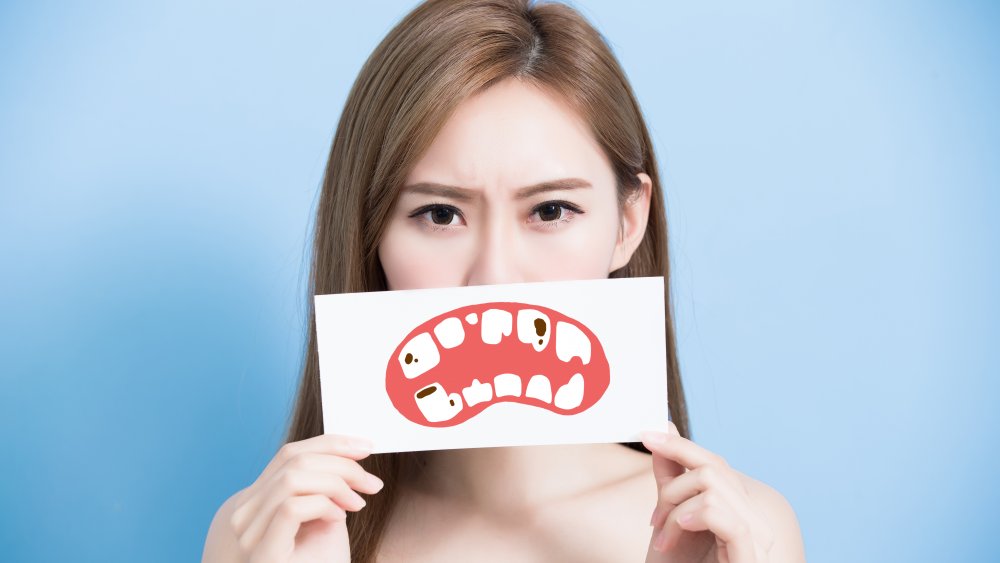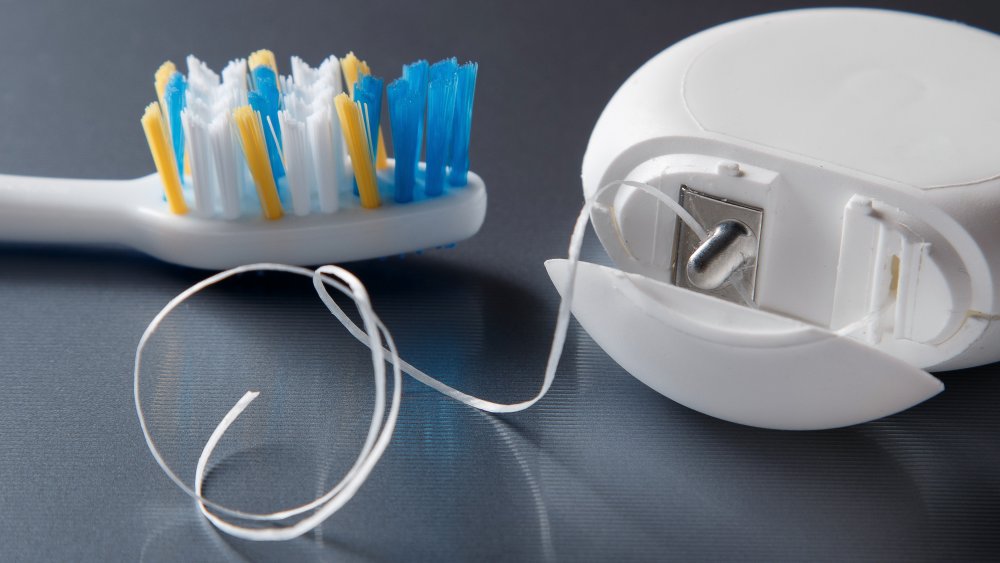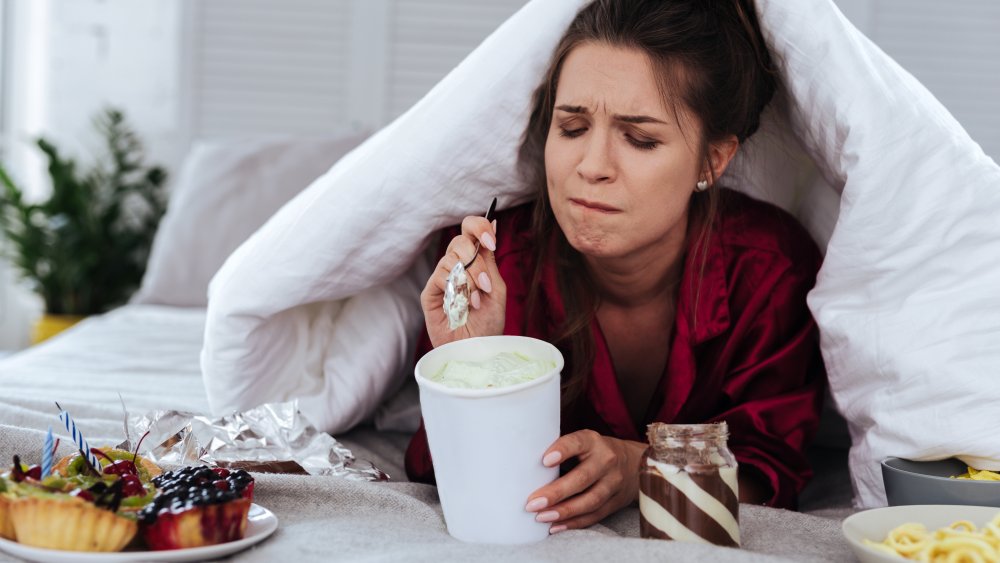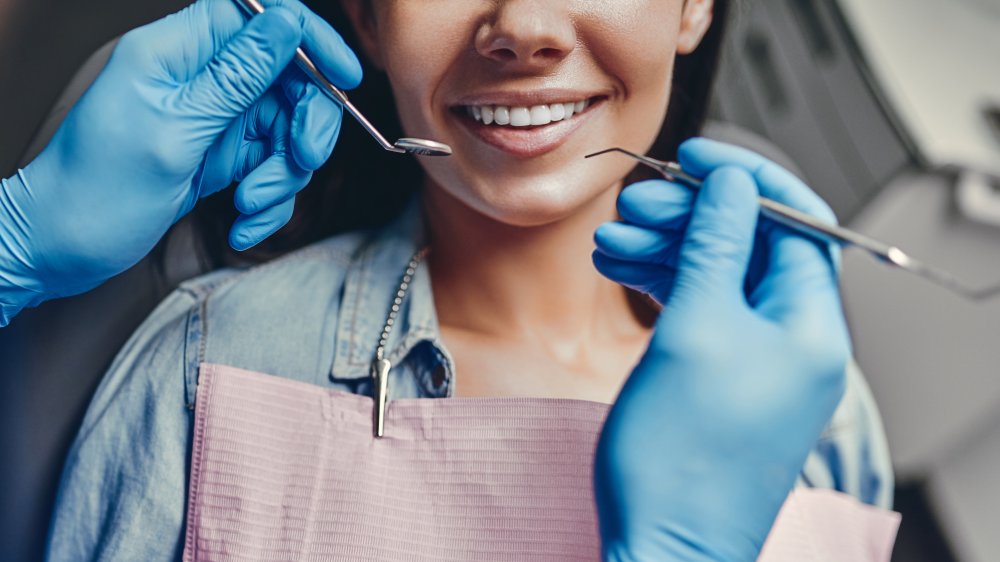Are Masks Causing 'Covid Cavities'? This Dentist Says That's Bogus
As if we didn't have enough to worry about in the midst of the pandemic: Now there is concern that wearing masks to prevent the spread of coronavirus may be causing dental cavities. A Houston dentist blamed an increase in the cases of dental decay she's been seeing on the use of face masks. "Now that a lot of us are mouth breathing while we have our masks on, we're drying out all that saliva that usually protects us from getting cavities, and that's increasing our risk of cavities," Dr. Piya Gandhi told KAMC news in Lubbock, Texas.
While he doesn't question that Dr. Gandhi is seeing more cases of cavities, Dr. Kami Hoss, co-founder of The Super Dentists, the largest children's dental group in Southern California, respectfully disagrees that mask use could be the cause. In an interview with The List, Dr. Hoss broke down the many reasons why cases of cavities may be spiking — and none of these reasons include wearing a mask.
"Dentists, physicians, nurses, assistants and all sorts of healthcare providers have been wearing masks for decades. Does that mean we all have higher levels of cavities? Of course not," Dr. Hoss said. "If cavities are up — and that's a big if, since we don't have enough data yet — there could be a variety of reasons for it."
If you've missed a dental check-up, you're more likely to have a cavity
Pre-pandemic, most of us went to the dentist every six months. Skipping those check-ups because of shelter in place laws, self-quarantine, or simply because you're a little wary of going somewhere and sitting with your mouth wide open for an hour in the midst of an epidemic that's transmitted through your mouth and nose, means problems your dentist might have caught before they turned into cavities did not get the treatment they needed, Dr. Hoss noted. "Patients have been without a dentist for months, so of course the number of cavities have gone up. Cavities don't just pause because there is a pandemic," he explained. "They're likely to get bigger, may turn into infections and cause additional problems."
For pediatric patients, this is a particular concern, Dr. Hoss added. "This is more likely in younger children because the enamel on baby teeth is thinner than on the permanent teeth. Additionally, the pulp in primary teeth — baby teeth — is relative larger, so cavities can travel to the pulp/nerves and can cause more damage quicker," he said.
Being distracted by the pandemic may have led to lax dental hygiene
Another reason why cavities might be on the uptick is simply because we all stopped brushing and flossing regularly. Hey, Dr. Hoss gets it — we've all had a lot on our minds. "Kids have been home for months and their daily routines have been upended. Parents have had to juggle all sorts of responsibilities ranging from working at home to helping their children with their school work," Dr. Hoss sympathized.
When you're grappling with an international crisis that may have impacted your health and your livelihood, and you're trying to participate in a Zoom conference call while homeschooling your kid, it's understandable that you might have given regular brushing the brush-off. "They've had new worries about their jobs, their own health, the health of their loved ones and so many other things, all while needing to become an expert on a virus that has brought the world to its knees," Dr. Hoss said. "In other words, [patients] may have been a little distracted to make oral care a big priority."
Stress eating usually involves sugar, which is bad for your teeth
Another reason why we might have more cavities: We're eating all the junk food these days. Between our banana bread binges and "quarantinis," the quarantine lifestyle has led to some dietary habits that aren't exactly conducive to good oral health. "Although some people have taken advantage of the stay-at-home orders and have improved their health by eating healthier, exercising and taking care of their mouths, many of us have been eating unhealthy food, drinking too much coffee or alcohol and neglecting our oral health," Dr. Hoss said.
Even before the pandemic, the average American consumed about 150 pounds of sugar a year. And now? All bets are off. And that's bad news for our teeth. "Excessive sugar can shift the balance of our oral microbiome — which are the billions of microbes who live in our mouths — toward the ones that metabolize simple carbohydrates," Dr. Hoss explained. "In return, these bacteria release acids that can damage the enamel and cause cavities."
What you can do to protect your dental health in a pandemic
With no obvious end to the pandemic in sight, it's time to prioritize your dental health now, Dr. Hoss advised. Put down the jelly beans and pick up that tooth brush. "Limiting sugary foods and helping your children with their daily brushing and flossing routines can go a long way in marking them healthier in all sorts of ways," Dr. Hoss advised.
And call your dentist, ASAP. "With dental offices reopening across the country, it's also time to give the dentist a visit because your oral health is too precious and necessary to wait it out until the pandemic is over," Dr. Hoss said. Although he does not accept the premise that mask use has anything to do with cavities, he agrees with Dr Gandhi 100% regarding her comment that "being in a dentist's office right now is one of the safest places you can be." Dr. Hoss dittoed this, noting, "Dental offices have worked extremely hard to provide a safe environment for everyone in your family and they'll be happy to help you and your kids stay healthy and cavity-free."
